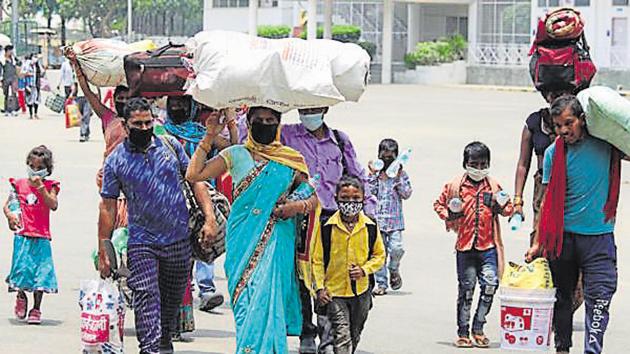US to Haryana, backlash against migrants grows
All are clear signs that the pandemic, and the economic disruption it has inflicted, has added to the already growing backlash against free movement of labour across the world.
International students in the US – there are at least 200,000 from India – might have to leave the country or risk deportation, if their universities shift to online-only mode. The US also suspended for this year the H1-B visa programme, used by a lot of skilled Indian workers, last month. Kuwait’s parliament has passed a bill putting quotas on the migrant population that could force 800,000 Indians to leave the country. And closer home, the Haryana government has issued an ordinance to reserve 75% private sector jobs for applicants from the state.

All are clear signs that the pandemic, and the economic disruption it has inflicted, has added to the already growing backlash against free movement of labour across the world.
At a time when India has also imbibed self-reliance as the cornerstone of post-pandemic recovery, there is a need to seriously examine the implications of such a sentiment.
World Bank data shows that India received the highest amount of personal remittances, $ 83.1 billion, in 2019. This is more than combined amount received by Mexico and Philippines, countries ranked second and third that year. Net personal remittances, or remittances received after subtracting remittances paid, for India were $75.6 billion in 2019. These numbers have been continuously increasing.
The net remittances received in 2019 amount to 2.6% of India’s GDP. To put this in perspective,the amount is more than double of what India spends on health. As is obvious, India will stand to lose the most if there is a major backlash against immigrant workers. (See Chart 1)

The importance of migrant workers in the Indian economy is not limited to those who cross international borders. The Economic Survey, an annual publication of the ministry of finance, estimated that almost a fourth of India’s workforce is made up of migrant workers. In their book “How Lives Change: Palanpur, India and Development Economics”, Himanshu, Peter Lanjouw and Nicholas Stern show that 70% of workers who left their villages for non-farm work travelled more than 50km . A third of such workers actually travelled at least 100km. A lot of them must have crossed state borders. A 2018 World Bank paper by Gaurav Nayyar and Kyoung Yang Kim found that migrant remittances had a share of 35% in Bihar’s gross state domestic product (GSDP) and positively affected consumption at the household level. Not all this migration is due to push factors, or poor income levels in states which send out migrants.
Migrant-receiving states are equally dependent. Southern states such as Tamil Nadu and Kerala, where population growth has slowed down considerably need more workers from states with high population growth to meet their labour requirements . While a lot of this migration is of unskilled workers, policies that hinder upward mobility for migrant workers are bound to create discontent. And the cascading effects of loss in remittance incomes will ultimately hurt demand in the country.
Any blanket policy which reserves jobs for local residents will also have an adverse effect on the talent pool available to enterprises. Annual Survey of Industry (ASI) data shows that 40% of India’s industrial jobs were located in just three states - Tamil Nadu, Maharashtra and Gujarat. If factories located in these three states were to hire just locals, or mostly locals, they would miss out on the talent pool available to them. Any such policy will also have serious consequences for India’s IT industry, which is concentrated in a handful of cities. (See Chart 2)

To be sure, the push for anti-immigrant policies has an objective basis. With economies in contraction mode across the globe, politicians are doing all they can to placate local workers, who are also voters. While such short-termism might be attractive at the moment, it can end up doing long term harm. Foreign students bring large amounts in tuition fees and a wealth of knowledge to the American higher education system. India’ rich states are critically dependent on migrants for a host of activities.
Political temptation for counterproductive policies during times of economic crises is not new. Economies tried to hurt each others’ exports by trade barriers or competitive devaluation during the Great Depression of the 1930s.
This is often referred to as a beggar-thy-neighbour policy. Because all countries replicated this, it only ended up worsening the situation. A century later, the world seems to have shifted from beggar-thy-neighbour to beggar-thy-neighbour’s worker.
As the highest recipient of remittances, it is in India’s interest to lead the charge against such a mindset. Doing this will require coherence in international and domestic policies.
Policies which institutionalise discrimination in dealing with migrant workers or state governments enacting legislations which exclude migrants from jobs are the opposite of what is required to demonstrate such coherence.
Get Current Updates on India News, Lok Sabha Election 2024 Live, Election 2024 along with Latest News and Top Headlines from India and around the world.




